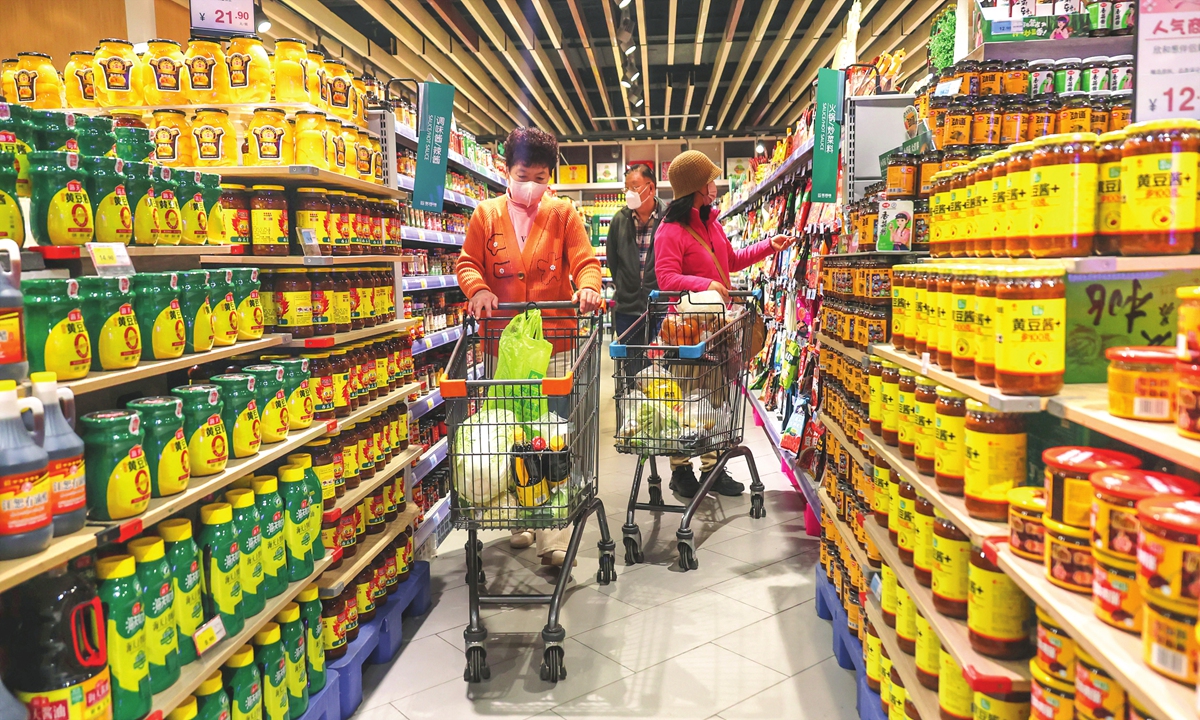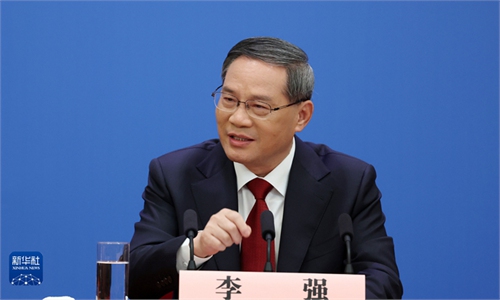China enters fast lane of economic recovery as retail sales pick up
Stable improvement across the board, laying foundation for realizing full-year growth target

People shop at a supermarket in Haizhou district of Lianyungang city, East China's Jiangsu Province on March 9, 2023. China's consumer price index (CPI), a main gauge of inflation, rose 1 percent year on year in February, the National Bureau of Statistics said on the day. Photo: VCG
China released its first batch of key economic data for 2023 on Wednesday, showing a stable improvement across the board as the economy has entered a fast lane of recovery following the downgrade of the COVID-19 management in January, building a solid foundation for achieving the full-year GDP growth target of around 5 percent.
"In the first two months, the Chinese economy steadily recovered with rising production demand, stable employment and consumer prices and improved market expectations," Fu Linghui, a spokesperson with the National Bureau of Statistics (NBS), told a press conference on Wednesday.
According to data released by the NBS, the total value added of the industrial enterprises above the designated size grew by 2.4 percent year-on-year in January and February, or 1.1 percentage points faster than that of December 2022, reflecting the accelerated recovery of industrial production and improved business expectations.
Meanwhile, the country's fixed-asset investment grew steadily by 5.5 percent year-on-year to reach 5.36 trillion yuan ($776 billion) in the first two months. Specifically, investment in real estate development declined by 5.7 percent year-on-year, which has narrowed compared with 10 percent year-on-year fall in 2022, according to the NBS.
Another highlight is the improvement and rebound in domestic consumption. The total retail sales of consumer goods reached 7.71 trillion yuan ($1.12 trillion), up by 3.5 percent year-on-year, reversing a downward trend in December, NBS data showed.
"The national retail sales excluding car consumption rose 5 percent year-on-year, indicating that the country's consumption has gained notable momentum along with rebound in consumer expectations and the steady resumption of off-line services," Zhou Maohua, an economist at Everbright Bank, told the Global Times on Wednesday.
"The confidence in China's housing market is gradually being regained too," Zhou said, noting that a positive impact occurred on both the supply and demand sides of the real estate sector as a raft of policy measures took effect.
Chinese shares rose on recovering optimism on Wednesday. The Hang Seng index, which tracks the Hong Kong stock market, jumped 1.58 percent to 19,551.21. In the Chinese mainland, the Shanghai Composite gained 0.55 percent to close at 3,263.31.
"We expect these major activity data to improve further in March," Nomura economists said in a report sent to the Global Times on Wednesday, projecting China's GDP will grow by 3.6 percent year-on-year in the first quarter this year.
Confidence in GDP growth
Considering China's current economic performance and other supportive factors put in place, China will be able to achieve its GDP growth target of around 5 percent, Fu said.
He admitted the target is challenging, as a complex external environment adds pressure on the global economy and weak overseas demand remains a concern. However, he pledged that the central government will step up policy support to expand domestic demand to give a boost to the realization of the economic target.
Buoyed by a good start in the first two months, international financial institutions recently further upgraded their expectations for China's economic growth for this year. On March 6, USB raised its forecast for China's GDP growth for this year to 5.4 percent from the previous 4.9 percent, saying China's economic reopening is better than they had expected earlier. The feared "second-wave" of COVID-19 infections didn't materialize with limited sign of supply disruption.
Western media continue to bad-mouth China's economic potential, with "China woes" dominating foreign media headlines, dismissing positive factors in the world's second-largest economy,
Claiming China's economy is "faltering," The New York Times said in an article published on Monday that China's factories are facing weakening demand from the US and Europe, neglecting that China has stepped up the creation of a dual-circulation policy in which consuption will become a real generator for its economic growth.
It's reckless for certain foreign media to make any pessimistic predition for China's economic recovery, Hu Qimu, deputy secretary general of the digital-real economies integration Forum 50, told the Global Times on Wednesday.
"It is the Western countries that should worry about a 'sluggish export of China' in 2023, which only means that their domestic consumption is in trouble, and the risk of stagflation is increasing," Hu said. He blamed the US' irresponsible financial policies, which have thrown the global market into uncertainties, for the weak overseas demand.
Amid a volatile international environment, China in December unveiled a guideline aimed at further expanding domestic demand with the goal to raise the scale of consumption and investment to a new level by 2035, which is seen as a deliberate attempt to offset the decline in external demand with the expansion of domestic demand in advance.
Meanwhile, the Chinese central government pledged to continue an employment-first strategy and increase government support to boost job creation, with around 12 million new urban jobs to be created this year.
"While stabilizing economic growth and employment, the country's macro-economic policies should also focus on stabilizing consumer price and preventing risks, as well as deepening structural reform," Zhou said, expecting support policies for micro enterprises, key infrastructure projects and technology and innovation firms, among others.
Nomura economists said the new government may provide more support to boost the confidence of the private sector this year, while taking measures to prevent and contain any financial risks in China, given the lessons from the recent financial turmoil in the US' banking sector.



